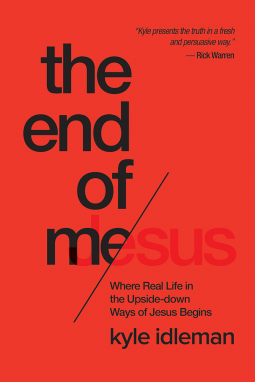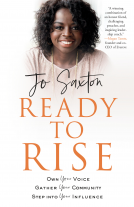
The End of Me
Where Your Real Life in Jesus Begins
by Kyle Idleman
This title was previously available on NetGalley and is now archived.
Send NetGalley books directly to your Kindle or Kindle app
1
To read on a Kindle or Kindle app, please add kindle@netgalley.com as an approved email address to receive files in your Amazon account. Click here for step-by-step instructions.
2
Also find your Kindle email address within your Amazon account, and enter it here.
Pub Date Oct 01 2015 | Archive Date Jan 08 2016
David C Cook | David C. Cook
Description
As he examines Jesus's Sermon on the Mount, Kyle unpacks the many counter-intuitive truths, including: brokenness is the way to wholeness, mourning is the path to blessing, and emptiness is required in order to know true fullness. Ultimately you will discover how Jesus transforms you as you begin to live out these paradoxical principles. Because only when you come to the end of yourself can you begin to experience the full, blessed, and whole life Jesus offers.
Available Editions
| EDITION | Paperback |
| ISBN | 9781434707079 |
| PRICE | $15.99 (USD) |
Average rating from 21 members
Featured Reviews
 Timothy S, Reviewer
Timothy S, Reviewer
Thanks to the author and publisher for proving an ARC for review.
I've read Not a Fan by this author, so I requested his new novel to read and review. This is a great book using the Beatitudes in the Bible to explain a concept very strange and foreign to our society. Idleman explains very well how brokenness leads to victory in Jesus. Where I end, Jesus begins. We are brought to think that winning should be the goal, but Jesus says we should set our own desires aside and allow Jesus to work within our frailty and weakness.
Great book that will make you think.
 Conrade Y, Reviewer
Conrade Y, Reviewer
One of the most profound mysteries of Christianity, often manifested in the words of John Newton's Amazing Grace, is "I once was lost, but now am found, was blind but now I see." In this very gentle and pastorally sensitive book, Kyle Idleman, Teaching Pastor of Southeast Christian Church in Louisville, Kentucky, tells us upfront that for Christ to reign in us, we must decrease. We must put an end to individual wants in favour of God's desires. When we declare the end of self, it marks the beginning of Christ's work in us. "Jesus became real when I came to the end of me." This is the single idea that reverberates throughout the whole book. Real life begins when our sinful nature ends. The first four chapters deal with what it means to pronounce the "end of me." The next five chapters build upon this as the beginning of the real me.
Part One is based on the first four beatitudes of Jesus in Matthew 5. He reflects on the poor and marginalized in society, and how a poor community in Paraguay was able to organize an orchestra with recycled and unwanted products. Contrasting a wealthy society with a poor, when Jesus talks about "Blessed are the Poor," it is only when we have nothing more that we can offer of ourselves that we start leaning not on ourselves but on the promises of God. In "Blessed are they who mourn," the author looks at the way we are so attached to things that the moment we lose them, we mourn and grieve. How can one be happy when one mourns? Is it not cruel or insensitive? The way to understand this beatitude is that, we are most happy when things shrouded in human wisdom come to an end. For Idleman, "mourning is true and focused grief." It is a beginning of true personhood. In "Blessed are the meek," we are reminded about humility and the danger of behaving like the Pharisees during Jesus' days. Are we performing on the basis of one's pride or are we serving humbly regardless of results. "Blessed are the Pure in Heart" is a call for us to be authentic. It is about sincerity that comes out of a pure heart, not full of ourselves but pure in heart. The author makes a keen observation on social media as well, saying that there is a tendency to show off in social media, to be more concerned about what other people think instead of being our true selves. With purity in heart, with hypocrisy away, we are ready to begin a real life in Christ.
Part Two touches on being strong, smart, and talented, not in our own wisdom or strength, but in God's wisdom and strength. We are most real about ourselves when Christ is most present in our hearts. The chapters are laid out in a series of contrasts. The first contrast is to be empty in order to be filled. With reference to the narrative in 2 Kings 4, we learn about how empty jars can be fully filled. Losing something may not be all bad, for it prepares one to be ready to receive new things. We contrast the nature of spiritual poverty versus physical poverty. We note how the busyness of life prevents us from noticing the beauty of ordinary time. We need to be full of the Spirit rather than full of ourselves. The second contrast is that helplessness is an opportunity for empowerment. Like people more willing to help a person who are out of sorts. There is no pride but humility. Acknowledging our weaknesses is a good start to getting help. The third contrast is about qualification and being chosen. If we were to apply to be a disciple of Jesus, would our educational qualifications and work experiences matter? Or is Jesus looking more for the humble and the teachable? The third contrast is weakness that we may exhibit God's strength. Common weaknesses include pride, insecurity, and self-righteousness. A notable cultural phenomenon is that there are bestsellers that talk about "success" and "strengths" but few talk about failures and weaknesses. When we submit them before God, we let God turn them upside down into right-side up. Finally, Idleman helps readers to understand what it means to deny ourselves.
In a sense, there are two beginnings in this book. The first part is about beginning to put an end to self-efforts and self-oriented lifestyles. The second part is the beginning of putting Christ as Lord over all. Written in a very accessible manner, Idleman's clear thinking and examples cut away any theological jargon to enable one to focus on what it means to die to self, to take up our cross, and to follow after Jesus. How we begin is important. It is to let ourselves decrease while God increase in us. It is a call for us to embark upon a life in Christ without us being a drag to ourselves. If we truly love God and claim to follow after Jesus, this book is a laser beam that can burn away the cancerous cells of self, so that our true persons can grow and flourish in Christ.
Rating: 4 stars of 5.
conrade This book is provided to me courtesy of David C. Cook Publishers and NetGalley in exchange for an honest review. All opinions offered above are mine unless otherwise stated or implied.
 Kyle R, Reviewer
Kyle R, Reviewer
I received this as an ARC from David C. Cook Publishing through NetGalley. I have read both "Not A Fan" and "AHA" by Kyle Idleman (both of which are very good), but I must say I believe "The End of Me" is Idleman's best so far.
The idea for this book came to Idleman when he posted the following on his Facebook page - Finish this sentence: "Jesus became real when..." He received many great answers, some of which he shares in the book, but the one that stuck out to him was "I came to the end of me". The fact is that we live in a selfish society, and, because we are selfish, we do not want to take the bold leap of dying to ourselves to completely follow Christ.
"The End of Me" is divided into two parts. The first section discusses four of the Beatitudes from the Sermon on the Mount. The second section discusses how we can serve God and be used by Him when we come to the end of ourselves. Overall this is very well written, providing copious scriptural references and tying them to real world examples. Idleman's characteristic wit and mild sarcasm are also noted throughout. Personally, I thought the first section was more powerful. It seemed to lag just a little in the middle, but quickly picks up towards the end for a strong finish.
The four Beatitudes that are discussed (from Matthew 5) are:
1. Blessed are the poor in spirit, for theirs is the Kingdom of heaven 2. Blessed are those who mourn, for they will be comforted 3. Blessed are the meek, for they shall inherit the earth 4. Blessed are the pure in heart, for they will see God
Matthew 12:34 says "the mouth speaks from the overflow of the heart". Idleman points out that when what is on our inside matches up with what is on our outside, we are pure in heart and where God wants us to be. Jesus calls us to live one life and to live it out in the open. His name for that is purity of heart, and the reward for that is a rich and fulfilling blessing in life.
This is not a book to read to feel better about yourself. Romans 3:23 says "All have sinned and fall short of the glory of God". Living for Christ takes daily devotion. You have to be willing to die to yourself to let God take the reigns. The end of me is where real life begins. And Jesus says that once I die, I can truly live.
 Jeanie S, Reviewer
Jeanie S, Reviewer
Getting to the end of me means I’m not so worried about performing for others anymore. Getting to the end of me means I’m no longer interested in faking it, because I understand God is looking for the real me.
The book starts with this sentence: Jesus became real when….? You may have come up with answers depending on your experience but how real does Jesus become when we come to the end of ourselves. In the Kingdom of Heaven is upside down when it comes to the world that we live in. The world tells us to watch out for #1, Me. God’s kingdom says the last will be first and the first shall be last. The world tells us advancement is success. God’s Kingdom tells us to end me; I have to die to self.
This pragmatic humorous study takes the Beatitudes to show how backwards the Kingdom of God is for us. I think the humor does well in this study as it reveals the real you and how much we get in the way of the gospel and Christ’s work in us. We are so filled with insecurity, the need for affirmation, bitterness, entitlement, performance living, pride.etc. , how can we be filled with the Holy Spirit? In order to be filled with the spirit, we must come to the point of emptying ourselves. We must come to the End of me..
The End of Me starts with us being broken. We are all about being complete, but the broken is risky and requires faith. It is owning up to our brokenness because WE all our broken. The Beatitudes include a blessing and woe. Do we have the right understanding of what a blessing is? This chapter on blessing was a real blessing to me. Blessing is kingdom focused.
The End of Me is dealing with the Pharisee in me. This was a surprising look on what it means to be a Pharisee and before you say, that’s not for me…you may be Pharisee. The Pharisee is a contrast of what the Kingdom of God is building. The Pharisee builds himself, protects himself, - The kingdom of God denies himself and leaves himself vulnerable to love others.
The End of Me.. is learning to learning to humble myself. It is taking opportunities to think more of others than what my needs are. Humbling is not passive but an intentional act on my part.
Some of the best quotes are the following:
Pride is best buddies with insecurity.
Praying before others, we have a tendency to talk more to the people in the room than to God.
How many blessings have I missed out on, not because I wasn’t capable, but because I wasn’t vulnerable?
A daily decision and a daily demonstration.
I enjoyed getting to the End of Me as I can see more of God and His Goodness and living out the Gospel.
A Special Thank You to David C Cook and Netgalley for the ARC and the opportunity to post an honest review
This is one book that can resonate with so many people. It is based around Christianity but the idea of Jesus being greater than I can ever can be is something that seems to work. There are a great many individuals that teach us great things and this book helps to understand what Jesus was teaching.
Putting ourselves on the back burner is something that can be very difficult for every person. But it doesn't have to be so hard when we remember what Jesus did and who he was.
We are the people who yell at each other in the car on the way to church, then climb out with sunny smiles to demonstrate it's all good. We are the people who think God is somehow more impressed with us because we make up our own rules and follow them. We are the people who have gone deep in debt to keep up appearances. We are the people who look down on others who are different. We are the people who take the easy way out and log on to the porn site. We are the people who work fifty-plus hours a week, trying to prove our worth.
This paragraph sounds harsh, and it is, but it is all about really being who we are meant to be, not what we think we should be, or what we think our neighbors think we should be!
It's a hard lesson, and one every Christian should know, but it also goes for those that are not Christians. I became a Christian because I wanted to follow in the footsteps of a person that put so many others before himself.
There are many passages like the one above in this, but it was never said that following Jesus was going to be an easy path but it can be a rewarding one. Really looking into the mirror and being able to see what changes we need to make is the first start. The anecdotes in this book really help to see where things need to be put into perspective, and maybe some changes made.
This is fantastically written and very well done.
"When we mourn, He says--when life gets extremely difficult, when we experience the deepest suffering we've ever encountered, when we come to the end of ourselves--then we are blessed."
Idleman uses the oft-confusing beatitudes (Sermon on the Mount, Matthew 5) as the platform for this whole book; contrary to what we might think, when we are at our very "worst", that's the time we can come closest to Jesus. "Reaching the end of me is a daily journey I must make because it's where Jesus shows up and my real life in him begins." The first few chapters were my favorite. After that it seemed repetitive but I admit that this could be the fault of the reader.
I loved Idleman's interpretation of Luke 7. Jesus is invited to eat dinner with Simon, a religious leader. Simon is rude. In the middle of dinner, a prostitute bursts in. Despite everyone's obvious disgust, she washes Jesus' feet (which was apparently the host's responsibility!) with her hair and her own oil. Without the cultural context, I missed how much Simon dissed Jesus. His behavior makes the prostitute's reaction to Jesus all the more amazing. This book is full of anecdotes, personal stories, and Biblical examples to support Idleman's points.
Some of my Favorite Quotes:
On the idea that things we typically see as "bad" (weakness, poverty, mourning, etc.) can be good:
"Embrace the paradox: Brokenness is the way to wholeness."
"God will not waste your pain...God will not leave you alone."
"There's nothing life can throw at us that God can't use to draw us nearer to Him."
On humbling ourselves to exalt Jesus:
"The Bible tells us in no uncertain terms, "All have sinned and fall short of the glory of God" (Romans 3:23). The real question is whether we can own up to it."
"I've come to realize that if me gets in the way, I'll miss out on the real life I'm meant to live. The life in which I love others and make a difference in the world."
"...when we get to the end of ourselves and finally realize we aren't strong enough, smart enough, or talented enough, then ironically we have never been in a better position to be used by God in significant ways."
On works:
"Performance-based religion is the false foundation of choice for many of us who grew up in the church."
Thank you to NetGalley for this read!


















